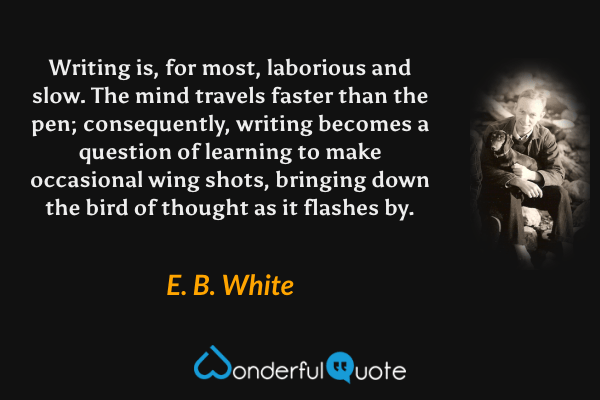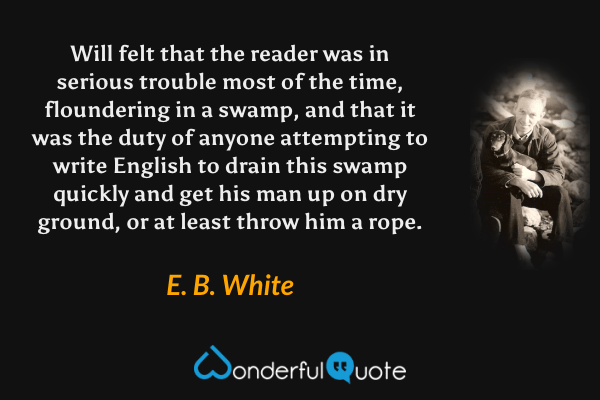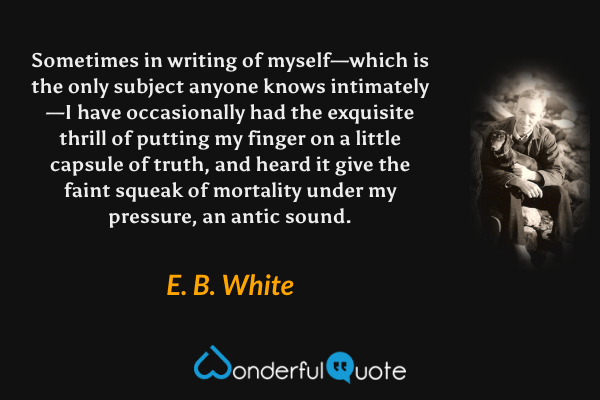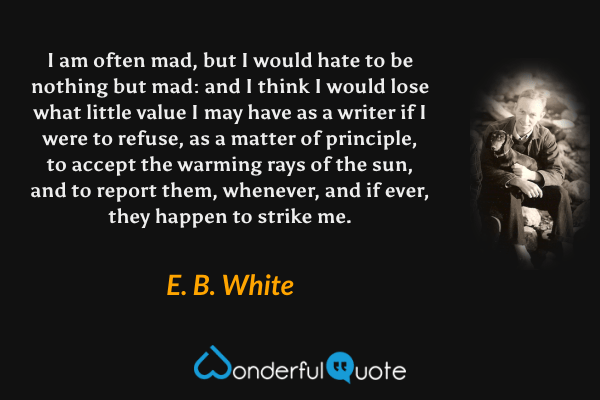E. B. White Quotes
Most popular E. B. White Quotes

Advertisers are the interpreters of our dreams.

Always be on the lookout for the presence of wonder.

He unzips the veil from beauty, but does not remove it.

One of the most time-consuming things is to have an enemy.

Genius is more often found in a cracked pot than in a whole one.

The whole problem is to establish communication with one's self.

Everything in life is somewhere else, and you get there in a car.

Luck is not something you can mention in the presence of self-made men.

I hold one share in the corporate earth and am uneasy about the management.

A good farmer is nothing more nor less than a handy man with a sense of humus.

His words leap across rivers and mountains, but his thoughts are still only six inches long.

There is nothing more likely to start disagreement among people or countries than an agreement.

Commas in The New Yorker fall with the precision of knives in a circus act, outlining the victim.

The trouble with the profit system has always been that it was highly unprofitable to most people.

Democracy is the recurrent suspicion that more than half of the people are right more than half the time.

You're terrific as far as I'm concerned, and that's what counts. You're my best friend, and I think you're sensational.

A despot doesn't fear eloquent writers preaching freedom — he fears a drunken poet who may crack a joke that will take hold.

Old age is a special problem for me because I've never been able to shed the mental image I have of myself—a lad of about nineteen.

I arise in the morning torn between a desire to improve the world and a desire to enjoy the world. This makes it hard to plan the day.

Humor can be dissected, as a frog can, but the thing dies in the process and the innards are discouraging to any but the pure scientific mind.

In a sense the world dies every time a writer dies, because, if he is any good, he has been a wet nurse to humanity during his entire existence.

It is easier for a man to be loyal to his club than to his planet; the by-laws are shorter, and he is personally acquainted with the other members.

Books are good company, in sad times and happy times, for books are people—people who have managed to stay alive by hiding between the covers of a book.

New York is to the nation what the white church spire is to the village—the visible symbol of aspiration and faith, the white plume saying the way is up!

Since writing is communication, clarity can only be a virtue. And although there is no substitute for merit in writing, clarity comes closest to being one.

I would feel more optimistic about a bright future for man if he spent less time proving that he can outwit Nature and more time tasting her sweetness and respecting her seniority.

Martinis . . . have a muting effect on the constant ringing in my ears, and as five o'clock approaches, my thoughts turn toward the elixir of quietude. Gin stops the bell from tolling.

Young writers often suppose that style is a garnish for the meat of prose, a sauce by which a dull dish is made palatable. Style has no such separate entity; is nondetachable, unfilterable.

The breezy style is often the work of an egocentric, the person who imagines that everything that pops into his head is of general interest and that uninhibited prose creates high spirits and carries the day.

Writing is, for most, laborious and slow. The mind travels faster than the pen; consequently, writing becomes a question of learning to make occasional wing shots, bringing down the bird of thought as it flashes by.

The living language is like a cowpath: it is the creation of the cows themselves, who, having created it, follow it or depart from it according to their whims or their needs. From daily use, the path undergoes change.

When I was a child people simply looked about them and were moderately happy; today they peer beyond the seven seas, bury themselves waist deep in tidings, and by and large what they see and hear makes them unutterably sad.

It has never struck me as harmful to make a conscious effort to elevate one's thoughts, in the hope that by doing so one's writing will get off the ground, even if only for a few seconds (like Orville Wright) and to a low altitude.

Avoid the use of qualifiers. Rather, very, little, pretty—these are the leeches that infest the pond of prose, sucking the blood of words. The constant use of the adjective little (except to indicate size) is particularly debilitating.

Delay is natural to a writer. He is like a surfer—he bides his time, waits for the perfect wave on which to ride in. Delay is instinctive with him. He waits for the surge (of emotion? of strength? of courage?) that will carry him along.

When you overstate, the reader will be instantly on guard, and everything that has preceded your overstatement as well as everything that follows it will be suspect in his mind because he has lost confidence in your judgment or your poise.

Will felt that the reader was in serious trouble most of the time, floundering in a swamp, and that it was the duty of anyone attempting to write English to drain this swamp quickly and get his man up on dry ground, or at least throw him a rope.

The essayist is a self-liberated man, sustained by the childish belief that everything he thinks about, everything that happens to him, is of general interest. He is a fellow who thoroughly enjoys his work, just as people who enjoy bird walks enjoys theirs.

Sometimes in writing of myself—which is the only subject anyone knows intimately—I have occasionally had the exquisite thrill of putting my finger on a little capsule of truth, and heard it give the faint squeak of mortality under my pressure, an antic sound.

I am often mad, but I would hate to be nothing but mad: and I think I would lose what little value I may have as a writer if I were to refuse, as a matter of principle, to accept the warming rays of the sun, and to report them, whenever, and if ever, they happen to strike me.

The essayist arises in the morning and, if he has work to do, selects his garb from an unusually extensive wardrobe: he can pull on any sort of shirt, be any sort of person, according to his mood or his subject matter—philosopher, scold, jester, raconteur, confidant, pundit, devil's advocate, enthusiast.
Democracy is the recurrent suspicion that more than half of the people are right more than half of the time.


